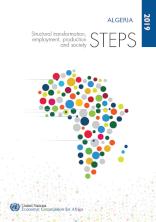STEPS profile Algeria

From an average of 1.6 per cent during the 1990s, the GDP growth rate rose to an average of 3.7 per cent between 2000 and 2014. This period has been marked by a significant catch-up in infrastructure construction. Capital expenditure increased from 20 per cent of government expenditure in the late 1990s to 40 per cent between 2006 and 2014. Over this period of prosperity driven by high oil prices, public spending rose sharply. Personnel and social expenditure, consisting mainly of subsidies (food, energy, housing), has been an important factor behind the rise in public spending, in particular from 2011 onwards, reaching its highest level in 2015, at 45.8 per cent of GDP.
With the sharp fall in oil prices in 2014 and the persistence of this shock, the sustainability of the country’s growth model has been threatened by the rapid deterioration in public finances and the current account balance. The budget balance showed a deficit of -15.3 per cent in 2015, reduced successively to -13.2 per cent in 2016 and -8.8 per cent in 2017. The current account balance, positive until 2014, fell from -4.4 per cent in 2015 to -16 per cent in 2016.
With the fiscal adjustments made by the Government to offset the deterioration in public finances, growth slowed in 2017 to 1.6 per cent, compared to an average of 3.4 per cent during the period 2010–2016. Accordingly, public investment efforts have not had the desired effect on the country’s endogenous development capacities. Moreover, private investment has not taken over from public investment; it is barely above 10 per cent of total investment. The industrial sector, excluding hydrocarbons, remains underdeveloped, contributing less than 5 per cent to GDP. Non-hydrocarbon exports have not diversified and their share in total exports is less than 5 per cent, while hydrocarbon exports are declining.
Faced with this situation, and with demographic pressure posing major challenges, in particular for job creation, Algeria must speed up its structural transformation.